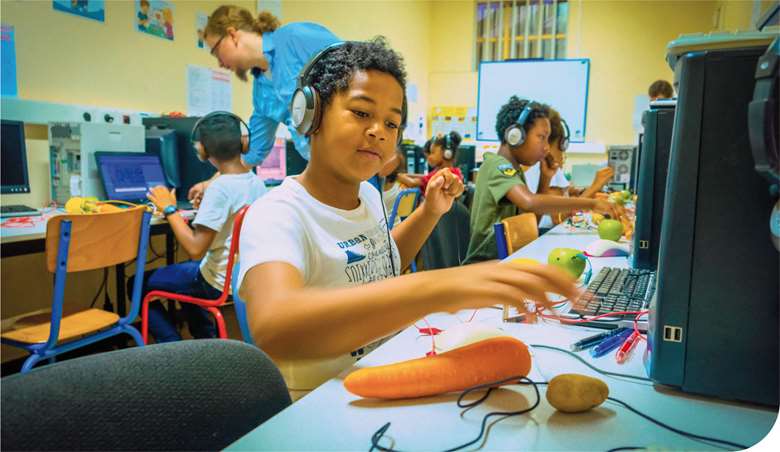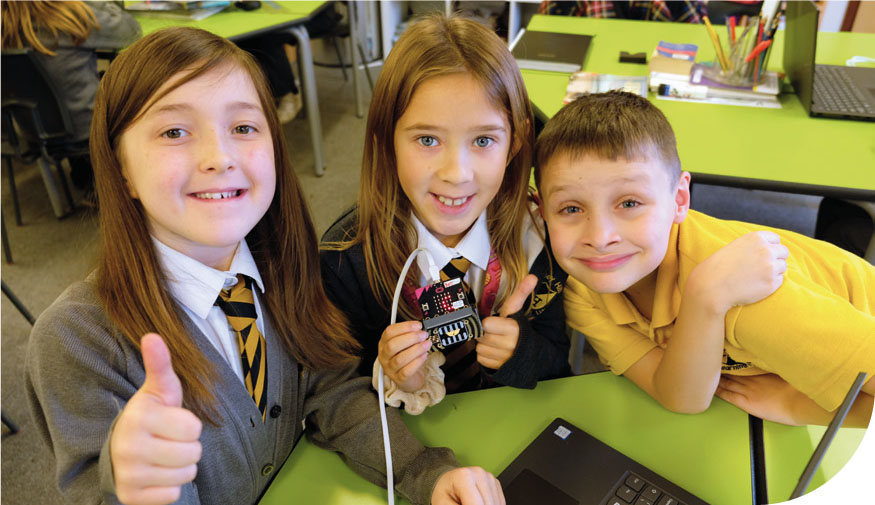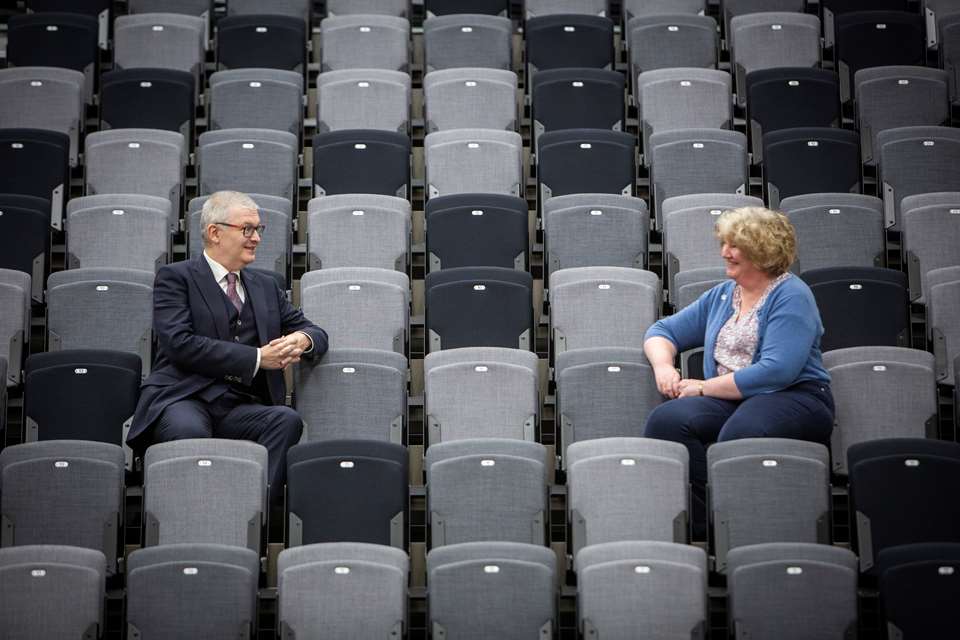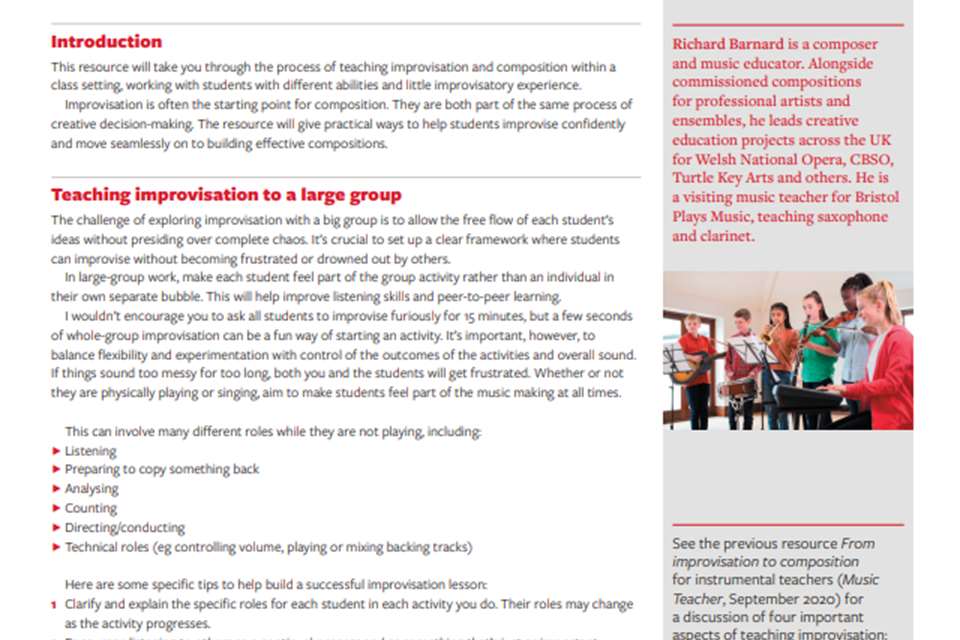Completing the circuit: Conductive Music
Hattie Fisk
Wednesday, September 1, 2021
Have you ever wondered if technology in the classroom could be more engaging and less complicated? Hattie Fisk speaks to Enrico Bertelli, executive director of Conductive Music, about his work to bring fun, accessible technology into the music classroom.

Conductive Music
A vibrant and energetic Enrico Bertelli appears on my computer screen, clutching a strip of metal with ‘Touch Me’ written on the front of it. He grips both ends of the strip, which is connected to his computer, causing a symphony to erupt. While this may be an alien gadget to me, this is part of Bertelli's daily toolkit, as it is one of the many pieces of equipment that Conductive Music uses to engage children in the classroom.
Putting music in the driving seat for cognitive skill development, the 12-person team at Conductive Music aims to change the way technology is used in music education, and education across the board. The team works with Music Education Hubs (MEHs) from across the UK and carries out school visits, aiming to bridge the gap between STEAM subjects: Science, Technology, Engineering, Arts and Maths.
Conductive Music offers a hybrid of technology and music, hosting in-person and online workshops for a huge array of students, ranging from Year 1 to university level. Teacher training is also part of their offering, and they encourage educators to use the equipment available to them to offer a range of exciting projects for students.
The tech
It is no secret that the technology used in most schools could be improved. Budgets are tight, meaning outdated systems remain in the education system for years; Bertelli tells me that, in his experience, schools often pay private companies for relatively expensive and often low-quality equipment, sometimes leaving education bodies suspicious of tech companies.
Although the ‘Touch Me’ bar may appear to be an expensive gadget, Conductive Music has a rule about the type of equipment they can use. Firstly, the tech cannot be over £70, as schools and children ultimately won't be able to afford it after the Conductive Music team leaves. Secondly, the tool needs to have an accompanying platform, like a free app or website, that the children can use from home or in class.
It is details like this that keeps Conductive Music an affordable and sustainable option for evolving music education. A huge element of Conductive Music's work is what remains after they leave a workshop or a project. ‘We want to go into schools and demystify technology – not only in the eyes of the students, but also in the eyes of teachers,’ says Bertelli. ‘It's not like we bring in magic objects to do these activities – you have them available to you.’
Bertelli says they ‘use everyday materials, always recyclable stuff’, which means using items that are often readily available in schools. One example of a project is a ‘Guitar Hero’-esque game in which a ruler is wrapped in tin foil and connected to crocodile clips, forming a make-shift guitar. ‘Even the technology we use, we tend not to bring it,’ Bertelli says, referencing the use of school laptops or iPads. The reason behind this is that they are trying to create ‘an incentive for teachers to repeat what they managed to do with the stuff the school already has'.
 © Conductive Music
© Conductive Music
Students in a Conductive Music workshop
A sea of black screens
Like many in education, the past year has been an uphill battle for the Conductive Music team, as despite running online workshops with students, it has been almost impossible to fully connect with them over the internet. For reasons of safeguarding, all students have remained with their cameras off, which presents a challenge when trying to navigate new tasks or problem-solve as, Bertelli points out, ‘a black screen doesn't really give you feedback’. Regardless, in workshops they use all the technological aids possible and ensure that nobody is left behind – offering three levels of difficulty, the workshops stretch the high-achievers and support those who may be struggling.
The company is pleased to be running things in person again, as Bertelli puts it: ‘When it's in person, it's much easier because you can see immediately if a student didn't get it, or if they need more help, or if the pace of the class is good’. When we speak, Bertelli has just got back from a day of running an in-person summer school. The week has had an Olympics theme, which involved musical video games that generate music as you play. There are basic skateboard and basketball games that the children code from start to finish, resulting in a mini tournament where the participants play each other's games.
A perfect combination
The workshops follow a ‘recipe’, according to Bertelli; the first ingredient is innovative lessons. The activities are always ‘gamified’ to create a fun workshop, rather than a traditional class. The second ingredient is accessibility, which is a huge element of their work. Accessible technology for teachers, as well as students, in a classroom setting is a non-negotiable priority.
The final ingredient is creating a tangible experience. Bertelli says it is ‘the same reason why people prefer physical books to Kindles', describing the physical interaction you can have with a book that is missing from its digital counterpart: the smell and feel of real, tangible pages. This is also the case for the technology Conductive Music offers: ‘The tangible effect is a game-changing experience,’ says Bertelli. While browser-based music games are amazing for accessibility and price, they miss the lasting experience that Bertelli and the team want to deliver with their experiences.
Starting young
I was surprised to hear that Conductive Music start coding with their students at age five; Bertelli believes it is important that we utilise technology from the youngest age possible. ‘We actually go down to Year 1,’ he tells me. ‘We use block-based coding, which means you're not writing – you're putting Lego blocks together.’ This gives children in earlier years the opportunity to use technology and learn in an accessible way. This option could also be given to students who struggle with language, or who have recently moved from a foreign-speaking country, to help them engage. These games also help with dexterity and motor skills development, which is a ‘hugely beneficial element of these activities in younger years', Bertelli says.
Technology like this can also help young children to comprehend the difference between their own body and someone else's. When you are coding, the code you input can move the arms and legs of a different object to yourself, which can be a foreign concept to young children. Bertelli reiterates: ‘Technology brings together many different topics at once’.
Subverting the classroom
Bertelli proudly tells me that their particular focus is ‘children from challenging backgrounds', and that often the children who respond positively to Conductive Music's work are those who struggle to engage with regular education methods. ‘It actually works really well with students who do not engage academically – whether these are students with special needs or [those experiencing] grief, or non-verbal students', he explains. One specific example involves a student eight years ago who had really engaged with the workshop; the Conductive Music team were told afterwards that he had come from a pupil referral unit and had not spoken to teachers or fellow pupils for the previous six months.
‘Unfortunately, the kids that we work with tend to be excluded very often, because of many different reasons. Inevitably, when you have such a large classroom, the teacher cannot follow everybody – it's impossible. The idea is that we give [these students] a time to shine, and maybe help to reverse the hierarchy of the classroom.’
Conductive Music aims to fill a technological void in schools, providing children with fun and engaging ways to learn new things across the curriculum. The team is on the brink of expansion, and they are crossing their fingers after sending off an application for further funding. They have recently launched a call to action to target the cold spot for music technology in the Midlands and are looking for more schools to get involved with their work.
To find out more, visit www.conductivemusic.uk






